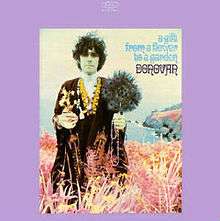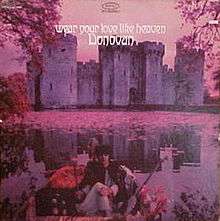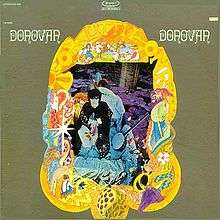A Gift from a Flower to a Garden
| A Gift From a Flower to a Garden | ||||
|---|---|---|---|---|
 | ||||
| Studio album by Donovan | ||||
| Released |
December 1967 (US) 16 April 1968 (UK) | |||
| Genre | Folk rock, psychedelic rock | |||
| Length | 59:24 | |||
| Label |
Pye NPL20000 (Monaural) / NSPL 20000 (Stereo) (UK) Epic L2N6071 (Monaural) / B2N171 (Stereo) (US) | |||
| Producer | Mickie Most | |||
| Donovan chronology | ||||
| ||||
| Singles from "A Gift From a Flower to a Garden" | ||||
|
||||
| Wear Your Love Like Heaven (Album 1) | ||||
 Epic LN 24349 (Monaural) BN 26349 (Stereo) (US separate release) |
||||
| For Little Ones (Album 2) | ||||
 Epic LN24350 (Monaural) BN26350 (Stereo) (US separate release) |
||||
A Gift From a Flower to a Garden is the fifth album from British singer-songwriter Donovan, and marks the first double album of his career and one of the first box sets in rock music. It was released in the US in December 1967 (Epic Records L2N 6071 (monaural) / B2N 171 (stereo)) and in the UK on 16 April 1968 (Pye Records NPL 20000 (monaural) / NSPL 20000 (stereo)). In December 1967, Epic Records also released each of the two records from A Gift From a Flower to a Garden as separate albums in the US. The first record was released as Wear Your Love Like Heaven, and the second record was released as For Little Ones. This was done to allow budgeting for the double album package, which included a folder of the printed lyrics to the second disc with artwork, and a cover featuring an infrared photo of Donovan by Karl Ferris who was his and Jimi Hendrix's personal photographer (requiring six colour separations for printing, instead of the usual four separations).
History
After recording the Mellow Yellow album, Donovan focused on releasing hit singles. "Epistle to Dippy" (essentially an inside-joke/open letter for a childhood friend) hit the top 20 in February 1967 and "There is a Mountain" (#11 US; #8 UK) followed in August.
Riding high on the success of these singles, Donovan entered the studio in October to record his next album. The double album that resulted from these sessions consisted of one disc of electric pop music (Wear Your Love Like Heaven) and another of acoustic children's music (For Little Ones). The acoustic album allowed Donovan to present a facet of his songwriting that had not been featured on his singles. It also allowed him to show his strength as a guitar player and performer in a way that he could not when augmented by session musicians. In fact, Donovan's live performances of the time featured instrumentation and performances more in line with For Little Ones than his hit singles and the first record of A Gift From a Flower to a Garden.
While Mickie Most produced the single from the album ("Wear Your Love Like Heaven" b/w "Oh Gosh"), and is credited with the album's production, Donovan actually produced the bulk of the material himself, allowing Most the credit to help sales.
In the album's liner notes, Donovan explained his purpose in creating two rather different discs (one for the present generation, and the other for the "dawning generation"), and also denounced the use of drugs. Several of his earlier records had contained both veiled and open references to drug use (particularly marijuana and LSD), but since the release of Mellow Yellow, he had both been arrested and prosecuted for marijuana possession, and had seen people he knew turning to harder drugs (speed, heroin, cocaine), and the damage this caused in their lives. Instead, Donovan promoted the use of meditation and other techniques, in his new songs.
Songs
"Mad John's Escape" is a song written for a friend of Donovan's who escaped from a mental health centre. The song details Mad John's escape and subsequent adventures.
"Under the Greenwood Tree" was originally written by William Shakespeare, and set to music by Donovan for the Royal National Theatre, who planned to use it in a stage production. At the end of the song, Donovan sings "Will you, won't you... join the dance?" in reference to the chorus of "The Lobster Quadrille" in Chapter X of Lewis Carroll's Alice's Adventures in Wonderland.
"Epistle to Derroll" is dedicated to the banjo player and singer Derroll Adams, an early influence on Donovan.
Cover
The front cover photo design of Wear Your Love Like Heaven features a Pre-Raphaelite style infrared photograph of Donovan on the moat in front of Bodiam Castle by Karl Ferris who was his and Jimi Hendrix's personal photographer. The back cover photo was also a shot taken by Ferris in LA during Donovan's and Karl's initiation into Transcendental Meditation, and depicted Donovan visiting with Maharishi Mahesh Yogi.
Reception
| Professional ratings | |
|---|---|
| Review scores | |
| Source | Rating |
| AllMusic (original double album) | |
| AllMusic (for Wear Your Love Like Heaven) | |
| AllMusic (for For Little Ones) | |
| MusicHound | |
| The Rolling Stone Album Guide | |
The album earned a Gold Record award, for half a million sales, during 1970.
Track listing
Original double album
All tracks by Donovan Leitch, except where noted.
"Wear Your Love Like Heaven" (Album 1)
Side 1
- "Wear Your Love Like Heaven" – 2:27
- "Mad John's Escape" – 2:20
- "Skip-a-long Sam" – 2:26
- "Sun" – 3:17
- "There Was a Time" – 2:02
Side 2
- "Oh Gosh" – 1:48
- "Little Boy in Corduroy" – 2:34
- "Under the Greenwood Tree" (Words by William Shakespeare, music by Leitch) – 1:58
- "The Land of Doesn't Have to Be" – 2:30
- "Someone Singing" – 3:07
"For Little Ones" (Album 2)
Side 1
- "Song of the Naturalist's Wife" – 2:47
- "The Enchanted Gypsy" – 3:21
- "Voyage into the Golden Screen" – 3:15
- "Isle of Islay" – 2:24
- "The Mandolin Man and His Secret" – 3:35
- "Lay of the Last Tinker" – 1:49
Side 2
- "The Tinker and the Crab" – 2:55
- "Widow with Shawl (A Portrait)" – 3:02
- "The Lullaby of Spring" – 3:27
- "The Magpie" – 1:31
- "Starfish-on-the-Toast" – 2:45
- "Epistle to Derroll" – 5:44
Personnel
- Donovan - vocals, guitar, harmonica, whistling
- Eric Leese - electric guitar
- Cliff Barton - bass
- Jack Bruce - bass on "Someone's Singing"
- Ken Baldock - double bass
- Mike O'Neill - keyboards
- Keith Webb - drums
- Tony Carr - drums, bells, congas, finger cymbals
- Mike Carr - vibraphone
- "Candy" John Carr - congas
- Harold McNair - flute
Release history
| Region | Date | Title | Label | Format | Catalog-Nr. |
|---|---|---|---|---|---|
| United States | 12/1967 | A Gift From a Flower to a Garden | Epic | mono LP | L2N6071 |
| United States | 12/1967 | A Gift From a Flower to a Garden | Epic | stereo LP | B2N171 |
| UK | April 16, 1968 | A Gift From a Flower to a Garden | Pye | mono LP | NPL20000 |
| UK | April 16, 1968 | A Gift From a Flower to a Garden | Pye | stereo LP | NSPL 20000 |
| United States | Wear Your Love Like Heaven | Epic | monaural LP | LN 24349 | |
| United States | Wear Your Love Like Heaven | Epic | stereo LP | BN 26349 (stereo) | |
| United States | For Little Ones | Epic | monaural LP | LN24350 | |
| United States | For Little Ones | Epic | stereo LP | BN26350 (stereo) | |
Reissues
- On 3 May 1999, Beat Goes On Records reissued A Gift From a Flower to a Garden on compact disc in the UK.
- On 12 September 2000, Collector's Choice Music reissued A Gift From a Flower to a Garden on compact disc in the US.
- On 16 January 2001, Collectables Records released Mellow Yellow/Wear Your Love Like Heaven (Collectables 6644), which contained all of Mellow Yellow and the Wear Your Love Like Heaven portion of A Gift From a Flower to a Garden.
- On 26 January 2009, EMI reissued A Gift From a Flower to a Garden, remastered, on compact disc.
References
- ↑ Eder, Bruce. "Donovan A Gift from a Flower to a Garden". Retrieved 10 December 2014.
- ↑ Bush, John. "Donovan Wear Your Love Like Heaven". Retrieved 10 December 2014.
- ↑ Bush, John. "Donovan Wear Your Love Like Heaven". Retrieved 10 December 2014.
- ↑ Graff, Gary; Durchholz, Daniel (eds) (1999). MusicHound Rock: The Essential Album Guide. Farmington Hills, MI: Visible Ink Press. p. 355. ISBN 1-57859-061-2.
- ↑ Randall, Mac; Brackett, Nathan; Hoard, Christian (eds) (2004). The New Rolling Stone Album Guide (4th edn). New York, NY: Simon & Schuster. p. 253. ISBN 0-7432-0169-8.